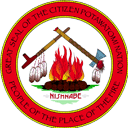
Many Americans are familiar with the symbolism of the American flag, the thirteen red and white stripes standing for the original 13 colonies and the white stars on a field of blue symbolizing the 50 states in the union. The Citizen Potawatomi Nation’s seal has its own particular symbolism, with each piece standing for a significant piece of Potawatomi heritage and history.
Originally the Potawatomi were part of a larger group of tribal nations including the Chippewa and Ottawa, sometimes referred to as Odawa. Upon their moves out of Canada to the shores of the Great Lakes, the three peoples split into separate tribal nations. The Chippewa went west to Lake Superior, the Ottawa eastwards to Lake Huron and the Potawatomi moved south to the shores of Lake Michigan. Despite the diversions, the Potawatomi kept their original role of protectors of the “council fire” of the three nations, resulting in their status as “Keepers of the Fire.”
The Citizen Potawatomi Nation are so called because after being removed to Kansas by the U.S., they elected to take the United States government’s offer of citizenship and allotments in Indian Territory, or modern-day Oklahoma.
Despite these removals and dual citizenship, the Potawatomi kept their traditions alive as Keepers of the Fire, a facet of their existence most evident in the CPN Tribal Seal.
The outer band of the seal is a circle signifying the sacred circle of life.
The colors of the tribal seal are white, yellow, red and black representing the four sacred directions and the four races of mankind.
The words across the top of the outer band give the name of the tribe, the Citizen Potawatomi Nation.
Written across the bottom of the outer band are the words, “People of the Place of the Fire,” which provide the most common translation of the Algonquin word “Potawatomi.”
Inside the seal is a fire comprised of seven logs representing the seven Potawatomi tribes in existence in the United States. The fire represents the Native pride burning fiercely within the hearts of the Potawatomi people and their position as keepers of the council fire. Fire is the symbol of the warmth of life and friendship, and the wisdom of the council fire.
The crossed calumet and war club signify strength in both peace and in war and are each decorated with eagle feathers. On the calumet they signify the Potawatomi gratitude and reverence for the eagle as a spiritual messenger. The eagle feathers on the war club honor our veterans. This symbolism is reminiscent of traditional Native protocol, where a dropped eagle feather is often accorded the same reverence and honor as a fallen warrior on the battlefield.
Finally, the word below the fire, “Nishnabe” is the singular form of the Potawatomi word for “person,” usually translated as “Indian.”
